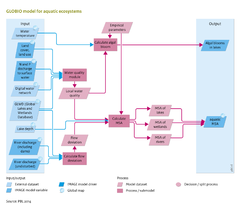Aquatic biodiversity: Difference between revisions
Jump to navigation
Jump to search
No edit summary |
No edit summary |
||
| Line 1: | Line 1: | ||
{{ComponentTemplate2 | {{ComponentTemplate2 | ||
|KeyReference=Alkemade et al., 2011b; Janse et al., submitted; | |KeyReference=Alkemade et al., 2011b; Janse et al., submitted; | ||
|Reference=Lehner and Döll, 2004; Moser et al., 1998; | |||
|InputVar=Land cover, land use - grid; N and P discharge to surface water - grid; River discharge - grid; | |InputVar=Land cover, land use - grid; N and P discharge to surface water - grid; River discharge - grid; | ||
|Parameter=GLWD (global lakes and wetlands database); Lake depth - grid; Digital water network - grid | |Parameter=GLWD (global lakes and wetlands database); Lake depth - grid; Digital water network - grid; Empirical MSA effect values; Water temperature - grid; | ||
|OutputVar=Aquatic MSA - grid; Algal blooms in lakes; | |OutputVar=Aquatic MSA - grid; Algal blooms in lakes; | ||
|Description=Inland aquatic ecosystems, including rivers, natural lakes, reservoirs, and wetlands, cover about 8 to 9% of the Earth’s continental surface ([[Lehner and Döll, 2004]]). The wetland area has declined considerably in the last century ([[Moser et al., 1998]]). Freshwater systems are dynamic and spatially interrelated , and the drivers of biodiversity loss partly differ from those of terrestrial ecosystems (see Section 7.2). Therefore, the effects of human-induced changes on the biodiversity of freshwater aquatic ecosystems is covered in a separate model in the IMAGE framework. | |Description=Inland aquatic ecosystems, including rivers, natural lakes, reservoirs, and wetlands, cover about 8 to 9% of the Earth’s continental surface ([[Lehner and Döll, 2004]]). The wetland area has declined considerably in the last century ([[Moser et al., 1998]]). Freshwater systems are dynamic and spatially interrelated , and the drivers of biodiversity loss partly differ from those of terrestrial ecosystems (see Section 7.2). Therefore, the effects of human-induced changes on the biodiversity of freshwater aquatic ecosystems is covered in a separate model in the IMAGE framework. | ||
Revision as of 09:30, 18 May 2014
Parts of Aquatic biodiversity
| Component is implemented in: |
|
| Projects/Applications |
| Models/Databases |
| Key publications |
| References |
Key policy issues
- How will the biodiversity in freshwater bodies develop in the absence of additional policies and measures?
- What are the key pressure factors causing loss of aquatic biodiversity?
- How will policies and measures to reduce the key pressure factors contribute to meeting the internationally agreed targets of the UN Convention on Biological Diversity (CBD)?
